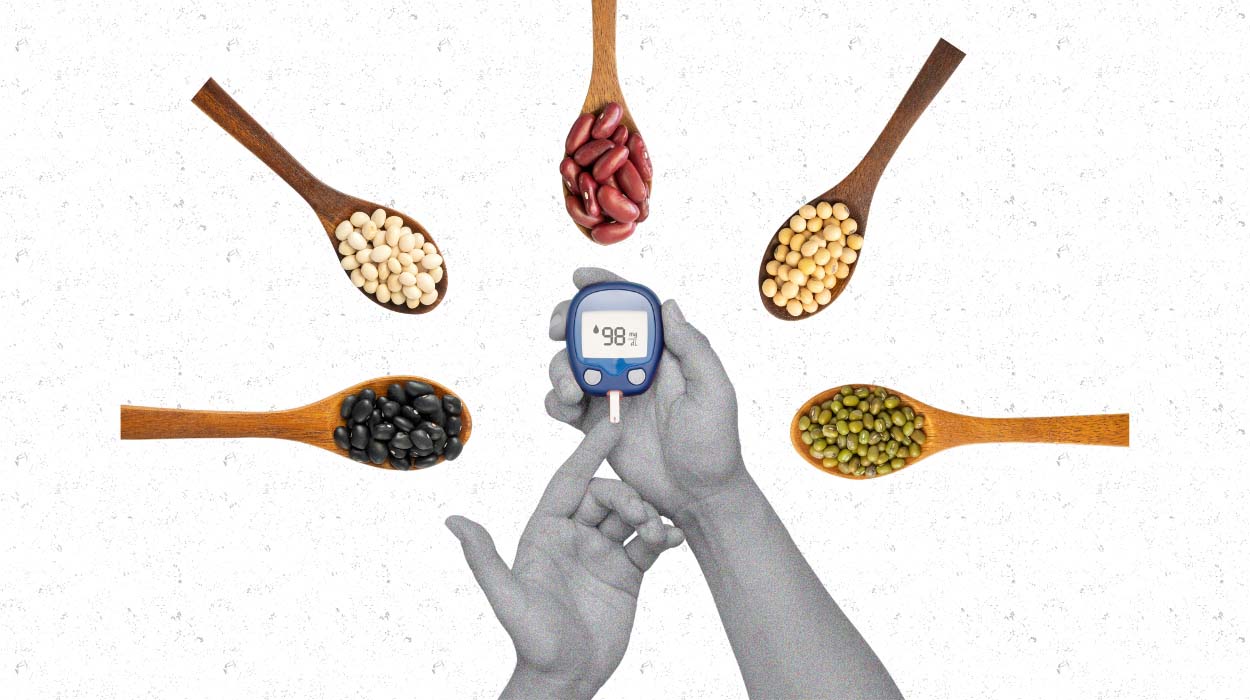 Expert's opinion
Expert's opinion
Expert's opinion
The article is a subjective view on this topic written by writers specializing in medical writing.
It may reflect on a personal journey surrounding struggles with an illness or medical condition, involve product comparisons, diet considerations, or other health-related opinions.
Although the view is entirely that of the writer, it is based on academic experiences and scientific research they have conducted; it is fact-checked by a team of degreed medical experts, and validated by sources attached to the article.
The numbers in parenthesis (1,2,3) will take you to clickable links to related scientific papers.
Can Diabetes Eat Beans: Best Types & Meal Planning In 2024

Beans are highly nutritious and tasty food for diabetes. They come in at least 400 varieties, making them a flexible meat substitute for various cuisines. Their rich fiber, protein, and vitamin content make them a healthy complement to any nutritious diet. Are beans good for diabetics? Can diabetics eat beans? Those with diabetes often ask this question when trying to make good eating choices. The answer is that beans can be an excellent addition to a diabetes diet. They have a low glycemic index, so reasonable portions don’t raise blood sugar levels.
The nutritional value of beans will be discussed in this article. Additionally, we will explore their unique health benefits in managing diabetes, the best types of beans, how to incorporate them into meal planning, and potential side effects.
Recognizing the benefits and drawbacks of beans can help people with diabetes make informed decisions.
Are Beans Good For Diabetics?
Yes, beans are a great food choice for people with diabetes and may even help them maintain healthy blood sugar levels. Beans increase satiety thanks to their ample fiber content, helping you to remain full longer.
Which Beans Are Good For Diabetics?
If you have diabetes, you can benefit from eating various beans. What are the best beans to eat? In particular, the best beans for diabetics include:
- Kidney Beans: Kidney beans are a great option for maintaining healthy blood sugar levels because they are high in fiber and protein and low in fat.
- Chickpeas: Chickpeas, sometimes called garbanzo beans, have a high concentration of both protein and fiber. They help with blood sugar control because of their low glycemic index.
- Black Beans: The anti-inflammatory and heart-health benefits of black beans are due to their high fiber and antioxidant content.
- Lentils: Lentils have a high protein and fiber content while having a low glycemic index. They are useful for those with diabetes and are a rich source of iron.
How To Use Beans For Diabetes Meal Planning
Here are some suggestions for including beans in your diabetes meal plan:
- Beans are a great source of fiber and protein and may be added to various dishes.
- Make snack foods like hummus, bean spreads, and other bean-based dips.
- Try making your own bean burgers or vegetarian patties as a more nutritious option.
- Fill tortillas, tacos, or burritos with refried beans instead of meat.
- Make healthy variations on traditional casseroles and pasta sauces by using beans.
- Use beans in spreads and frittatas to add variety to your morning meal.
- Mix beans, nutritious grains, and colorful vegetables in a bowl to create filling meals.
Visit a doctor or a registered dietitian for personalized recommendations, such as protein or vitamin supplements tailored to your condition.
Health Benefits Of Beans For Diabetes
Exploring the connection between beans and diabetes. Beans are good for people with diabetes for many reasons:
Nutrient-Dense
Beans are an excellent source of plant-based protein that aids in maintaining general health and controlling diabetes due to their high nutrient density. In addition, beans provide an excellent calcium, potassium, magnesium, phosphorus, and zinc source.
Helps To Control Blood Sugar Levels
Because of their beneficial effects on blood glucose levels, beans are a great option for people with diabetes. The high soluble fiber content of beans moderates blood sugar levels by delaying the digestion and absorption of carbohydrates.
It is important to remember portion sizes in diabetes meal planning to control blood sugar, so figure that 1/3 cup of cooked beans is one starch serving. Your number of allowable starches in a diabetes meal plan is individual based on your daily caloric needs to maintain a healthy body weight and your type of insulin if you are on insulin therapy.
Supports Weight Loss Efforts
To increase insulin sensitivity and blood sugar control, individuals with diabetes should strive to keep their weight healthy. The high fiber and protein content in beans can effectively aid weight management.
Consuming both fiber and protein together helps curb hunger and prevent overeating. Beans’ low glycemic index also means they cause blood glucose to be released into the bloodstream more slowly, which in turn aids in regulating appetite and keeping energy levels consistent.
Supports Heart Health
People who have diabetes are more likely to suffer from heart problems. Evidence suggests that beans can help lower low-density lipoprotein cholesterol levels and the risk of heart disease because of their high soluble fiber content. In addition, beans’ anti-inflammatory and blood vessel-protective antioxidants and phytochemicals can help to support the cardiovascular system.
Nutritional Value Of Beans
The following are the approximate nutrient values for one cup (approximately 171 grams) of cooked beans, based on data from the United States Department Of Agriculture:[1]
- Calories: 245.
- Carbohydrates: 44.8 grams.
- Fiber: 15.4 grams.
- Protein: 15.4 grams.
- Fat: 1.11 grams.
- Sodium: 1.71 milligrams.
- Potassium: 746 milligrams.
- Magnesium: 85.5 milligrams.
- Calcium: 78.8 milligrams.
- Iron: 3.57 milligrams.
- Zinc: 1.68 milligrams.
- Copper: 0.374 milligrams.
- Manganese: 0.775 milligrams.
- Folate: 294 micrograms.
- Vitamin K: 5.98 micrograms.
Please note that these values may vary slightly depending on the specific type of beans.
Dietary Fiber
Both soluble and insoluble fiber can be found in abundance in dry beans like kidney beans, black beans, or pinto beans. Soluble fiber, in particular, helps clear dietary cholesterol from the blood and stabilizes blood sugars. Insoluble fiber, on the other hand, draws water to the feces and encourages regular bowel movements. Possible benefits include reducing the risk of constipation, colon cancer, and other digestive health problems while lowering cholesterol, stabilizing blood sugar, and promoting good heart health.
Vitamins And Minerals
Potassium is another important mineral plentiful in most beans and is responsible for maintaining normal blood pressure. In addition, beans are an excellent source of water-soluble B vitamins that support optimal energy levels and a healthy heart.
Protein
Beans are an excellent source of plant protein, albeit incomplete protein. When combined with complementary amino acids, this protein is essential for the development and maintenance of bodily tissues, and it can also be broken down into glucose upon digestion for fuel. Grains, nuts, and seeds are perfect complementary sources of amino acids to combine with beans to comprise all nine amino acids.
Carbohydrates
Beans contain multiple types of carbs. These include starch, resistant starch, non-starch polysaccharides, and complex sugars known as oligosaccharides. These various carbs benefit digestive health and have low glycemic indices, making them less likely to affect a person’s blood sugar levels. Fiber, a type of non-digestible carbohydrate, is amply supplied by beans.
Sides Effects And Safety
Even though beans have many positive health impacts, they may have the opposite effect on some people. Gas, bloating, and abdominal pain are typical adverse reactions.
These problems can be lessened by easing into eating beans, soaking and washing dried beans before cooking, and using spices like cumin and fennel to assist digestion. When eating beans, drinking plenty of water is crucial to process the high fiber.
Due to their high potassium and phosphorus levels, beans may need to be restricted by those with illnesses such as kidney disease. For specific advice on working beans into your diabetes diet, it’s best to speak with a healthcare provider or registered dietitian.
The Bottom Line
Beans can be part of a diabetes-friendly diet because of their high nutritional value and adaptability. Among the many advantages they provide to health is the ability to control blood sugar, boost heart health, and manage weight.
Beans come in a wide variety, each with its own set of health benefits and culinary possibilities. Beans have been shown to help control diabetes. However, the effects of different bean varieties may vary from person to person. Monitoring your glucose levels and making dietary modifications as needed is recommended.
Consult your healthcare provider or qualified dietitian for tailored advice on the bean varieties and serving sizes most appropriate for you.
Frequently Asked Questions
No, when eaten in moderate portions, beans’ low glycemic index and high fiber content help control blood sugar levels.
People who are allergic to beans, have kidney disorders, or have other dietary limitations may need to avoid beans. Consult a registered dietitian for specific guidance.
The bean varieties richest in protein are soybeans, black beans, pinto beans, and kidney beans.
Yes, beans are safe for everyday consumption as part of a well-balanced diet. However, portion sizes and overall carbohydrate intake must be considered.
Canned beans are a great alternative because they are portable and preserve many nutrients that make them a healthy choice. Choose low-sodium or no-salt-added options.
Yes, beans are a good source of dietary fiber, which assists digestion, regulates bowel movements, and controls blood sugar.
Yes, beans assist in managing weight because their high fiber and protein content makes you feel full and controls your appetite.
Yes, beans are low in saturated fat, high in fiber, rich in antioxidants, and have plenty of phytochemicals that are good for the heart.
+ 1 sources
Health Canal avoids using tertiary references. We have strict sourcing guidelines and rely on peer-reviewed studies, academic researches from medical associations and institutions. To ensure the accuracy of articles in Health Canal, you can read more about the editorial process here
- Usda.gov. (2023). FoodData Central. [online] Available at: https://fdc.nal.usda.gov/fdc-app.html#/food-details/175200/nutrients



